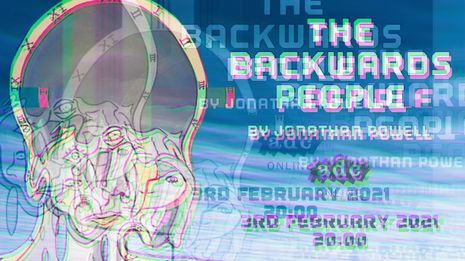The Backwards People soars into higher realms of dizzying possibility
Columnist Gregory Miller is full of praise for The Backwards People, happy to discover that it dazzlingly supersedes the possible obstacles of converted form.
.

We have returned to the starting place. It seems that, once again, many students have been forced to voyage into the murky waters of the radio play. As with the socially distanced productions of last term, we have the same trepidations. Will the production translate to this new form? Will contrivances show? Will we see the play’s gears churning away beneath the hull, despite its best attempts to hide them? Thankfully, no. Something which ‘The Backwards People’ amply demonstrates is that these supposed limitations of the radio play format are in fact disguised opportunities, opportunities which it seizes with both hands. Not one hand, mind, but both. Such is its zeal!
The first thing of note to mention, the thing which instantly takes a hold of you and places you in the play’s world, is Daniel Quigley and Anna-Maria Woodrow’s music, and the sound design of Kit Treadwell. It is a constant sputtering and dissolving, always on the verge of breaking down entirely, along with the world it is representing. Voices slow down, speed up, crackle and shake as if under immense pressure; it has the unsettling effect of seeing the seams when one really shouldn’t. At times, the mere timbre of the sound set the nape of my neck on edge and caused an unpleasant tingling sensation. It’s true that I was ill at the time, but the effect still stands. The music also aids this feeling, having the uncanny effect of a tape played in reverse. It unspools itself throughout the entire show, guiding and controlling like some stringy tendon. This music and sound design mean that the play, despite being audio only, has a tangibility to it. At points, it sounds like the whole thing is slowly dissolving in acetone. Believe me, that’s a compliment.
“There is a wonderful use of little verbal leitmotifs, which loop obsessively throughout.”
The play is artfully written by Jonathan Powell, and manages to find a way to indulge in themes of knowledge, memory, teleology and so on without ever losing sight of its characters. And special characters they are. Each character is rather like the Chinese actors Brecht noted, who maintain a certain distance from their role even as they play it. Much like with the music and sound design, these roles seem to splinter and come apart as the play proceeds. There is a wonderful use of little verbal leitmotifs, such as Chef’s ‘sizzle sizzle’, which loop obsessively throughout. Since Dixie’s direction is never scared to match the absurdity of the dialogue, these characters all stand out in sharp relief against each other. It’s as if these characters are holding onto the last few pieces of themselves which they know, savouring them even. The beauties of a radio play are such that these verbal recurrences leap out more, surprise more. It’s easier, for example, to let the Chef and his obsessions drop from your mind, and so each little ‘sizzle sizzle’ jumps into your head like an intruder. Because of this, the odd leaps and bounds of dialogue, the moments of reason suddenly punctured by bizarre babbling and the recurring motifs and non sequiturs shine all the more for floating free of their bodily counterparts.
“Dixie’s direction is never scared to match the absurdity of the dialogue.”
But it would be folly – folly, I tell you – to pretend that what makes this thing great stands merely in atmosphere. The production, directed by Dixie McDevitt, has an assured boldness in its performance. The Captain, played by Will Leckie, is both avuncular and imperious, his strained confidence soon coming apart deliciously. The Chef and the teacher, played by Isaac Allen and Ffion Godwin respectively, are a wonderful contrast. The former obsessive in his tractability, and the latter showing an ambivalent curiosity, as excited about potential answers as she is scared by the danger of the questions. The Poet, brought to cautious, inquisitive life by Sieve Bonaiuti, is the engine room of the thing. Their persistent questioning is as cautious as it is determined. As much as they want to unveil the truth, it is not so much for them as for the others on the ship. This understanding shone in the characterisation. And, of course, it would be much remiss of me to leave out the Child, in many ways the key to the thing, played by Maria Telnikoff. Its innocence, simplicity, and ultimately its generosity – a much-needed counterpoint to the crumbling personas in the rest of the play – was played incredibly well. Since Dixie’s direction is never scared to match the absurdity of the dialogue, these characters all stand out in sharp relief against each other. After all, we must know and understand these characters if we’re to pity them as they crumble.
It would be best now to draw this review to a conclusion. But what would be a good way to sum this show up? Well, since it does deal so much with texts and what they represent to us as people, it would be fitting to quote one of my favourite books. This is the late Sir Roger Inglesham’s ‘Disquisitions concerning the nature of man’. There is one thing he says in that book which I shall never forget, which is: ‘often to us it seems as though a rock lying upon the road may be an obstacle, unpassable by either reason, wit or judgement. But, by a mere shifting of our presentations and attitudes, this rock might seem unto us a ramp, which we can use to send us soaring into new, higher realms of dizzying possibility.’ I would not think it an overstatement to say that ‘The Backwards People’ proves this statement to be true. Onwards and upwards, indeed.
 News / CUP announces funding scheme for under-represented academics19 December 2025
News / CUP announces funding scheme for under-represented academics19 December 2025 News / Cambridge welcomes UK rejoining the Erasmus scheme20 December 2025
News / Cambridge welcomes UK rejoining the Erasmus scheme20 December 2025 Film & TV / Timothée Chalamet and the era-fication of film marketing21 December 2025
Film & TV / Timothée Chalamet and the era-fication of film marketing21 December 2025 News / SU reluctantly registers controversial women’s soc18 December 2025
News / SU reluctantly registers controversial women’s soc18 December 2025 News / News in Brief: humanoid chatbots, holiday specials, and harmonious scholarships21 December 2025
News / News in Brief: humanoid chatbots, holiday specials, and harmonious scholarships21 December 2025









